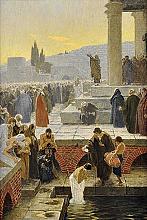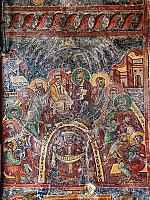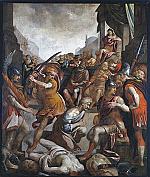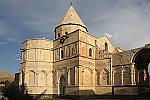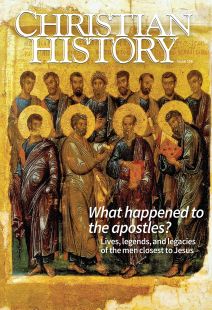From deserters to defenders
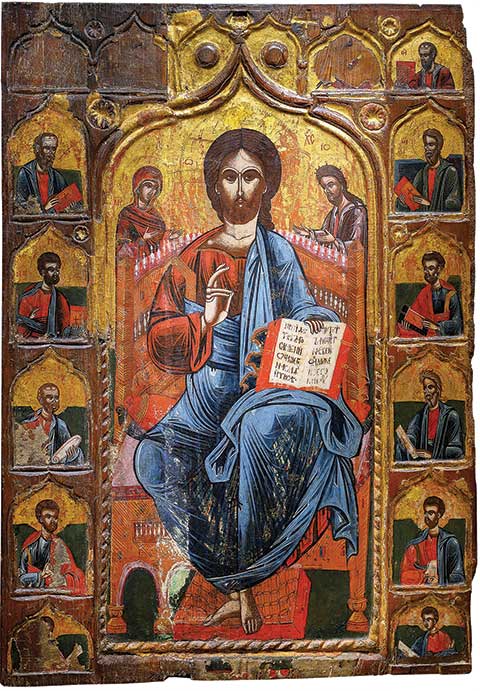
[ABOVE: Deesis with Apostles Altar table icon, 17th century. Serbian. The Žitomislić Monastery, Bosnia and Herzegovina—Adam Ján Figeľ / Alamy]
Not long before his death on the cross, Jesus called Peter “Satan.” Peter then denied Jesus three times to protect his own life. And yet, within a matter of weeks, Peter preached boldly at the risk of his life.
Humanly speaking such a dramatic change hardly makes sense. In fact the former fearful actions are more in keeping with the 12 apostles’ original characters. Bible scholars emphasize how badly the disciples failed Jesus throughout Mark’s Gospel. Yet Mark wrote for followers of Jesus who knew how faithful those disciples (minus Judas) would become; Mark just hints at how that shift happened. Jesus promised Simon (Peter) and his brother Andrew, “Follow me, and I’ll make you fishers of people!” (Mark 1:17). And John the Baptist summarized Jesus’s coming ministry like this: “He will baptize you in the Holy Spirit!” (Matt. 3:13).
Luke does not emphasize the disciples’ failures as much as Mark does. But because Luke has a second volume—the book of Acts—he gives us a fuller picture of what it means for Jesus to baptize his followers in the Holy Spirit. Luke’s account shows how the disciples developed and, through Jesus’s Resurrection, exaltation, and gift of the Spirit, received a new boldness for mission.
NORMAL PEOPLE
What would ordinary ancient readers assume about the disciples from the Gospel accounts? Commercial fishermen and tax collectors had a better economic standing than most of the population but fell far below the financial elite. They also lacked scribal education (Acts 4:13). And if Jesus’s disciples were like most ancient disciples of religious/philosophical teachers, most of them were probably in their midteens. Peter, who was married, may have been slightly older than the rest, and he seems to have risen quickly in prominence among them. Jesus had women followers too (see p. 54), but in that culture it was much more practical (and respectable) to send out teams of men.
The Gospels consistently show us that the disciples were human—normal people whose actions and words display common human strengths and weaknesses. For example while Jesus was training his disciples to take over much of his work after his Ascension, he still had to challenge them for their lack of faith in the midst of a storm. By this point in Jesus’s ministry, they should have known that the boat was safe with Jesus in it!
The disciples kept failing to understand, though the Gospel of Luke explains that the meaning was hidden from them. They argued over who was the greatest and, though Luke explains their weariness was because of sorrow, they slept when they should have been praying. “Why are you sleeping?” Jesus admonished them in Luke 22. “Get up and pray so you won’t fall prey to the testing that’s coming!”
Jesus reproved James and John for wanting to call down fire on Samaritans. Who could imagine that John would soon join Peter in serving those same Samaritans (Acts 8:14–17)? Peter initially felt too sinful to be with Jesus. Luke tells us that he became a target for Satan (Luke 22:31). Peter insisted that he was ready to face prison and death with Jesus; Jesus warned that Peter would deny him three times that same night.
Most of the Twelve, and finally Peter, failed the master they loved. When Jesus was arrested, Peter followed at a distance. As foretold he denied Jesus. Although he wept bitterly, with the others he left Jesus to face the rest of his mission alone.
And yet the risen Jesus restored, strengthened, and empowered them. Peter’s encounter with his Lord transformed him, and Luke underlines an additional element that made Peter a particularly bold witness for Christ: the promised Holy Spirit. This factor is so important for the handing off of Jesus’s ministry to the disciples that Luke both ends his first volume and begins his second by elaborating it.
PENTECOST’S PROMISE
Different parts of Acts 2 concerning the Holy Spirit’s work have been prominent for different movements in history, such as Anabaptists, the Stone-Campbell movement, Pentecostals, and others. Similarly the Spirit is foundational for understanding the most dramatic phase in the disciples’ transformation.
New Testament writers emphasize various aspects of the Spirit’s work. While all agree that the Spirit seals us and initiates us into unity with Christ at conversion, they also recognize the importance of subsequent reliance on the Spirit. Acts, which provides our clearest narrative window into early Christian mission, illustrates that even the apostles had multiple empowering experiences with the Spirit.
While the Spirit leads and empowers us in various ways, Acts especially emphasizes power for mission: “But you’ll receive power, when the Holy Spirit comes on you, and you’ll be my witnesses in Jerusalem, in Judea and Samaria, and to the farthest ends of the world” (Acts 1:8). Jesus addressed this promise to the 11 apostles and those who were with them, who could attest to the events of Jesus’s public ministry.
This promise was for both young and old as seen in elderly Anna (Luke 2:36–38) or in Philip’s young daughters (Acts 21:9). Pentecost fire also fell on a mixed group of men and women. That the promise embraced both genders is not a new interpretation. Many leaders in the nineteenth century already emphasized this passage, such as African Methodist Episcopal evangelist Julia A. J. Foote (1823–1901), Baptist leader A. J. Gordon (1836–1895), and Salvation Army cofounders William (1829–1912) and Catherine (1829–1890) Booth.
So what does this promise involve? First it is a foretaste of the future age of the kingdom. Earlier biblical prophets had announced that God would pour out his Spirit on his people at the time of their restoration (see Isa. 32:15 and 44:3; Joel 2:28, Ezek. 39:29, and Zech. 12:10).
Besides “pouring,” prophets used other fluid images for the gift of the Spirit: “I will sprinkle on you clean water . . . and I will put my Spirit in you” (Ezek. 36:25, 27), just as Luke uses fluid images such as “baptized” and “filled” in the books of Luke and Acts. The context of all the earlier prophecies, however, was the time of future restoration (see e.g., Ezek. 36:24; 39:27–28; Joel 3:1).
This is why, when Jesus talked about God’s kingdom and being baptized in the Spirit in Acts, his apostles asked, “Is this the time that you’re restoring the kingdom to Israel?” Jesus told them it was not for them to know the Father’s timing, but laid out their mission to the nations for the time in between. It is no surprise that Paul later treats the Spirit as the foretaste of our future inheritance in God’s kingdom in his letters to the churches. This promise was for all flesh—which meant more than Peter understood at first. When Peter later saw God give the Spirit to Gentiles, he realized that God was welcoming them also into his people!
PROPHECY AND PREPARATION
Second the promise includes prophetic empowerment. Scripture often has the Spirit enabling people to speak God’s message (e.g., Num. 11:25–26; 1 Sam. 10:6, 10; 19:20, 23; 1 Chron. 12:18; Luke 1:41–45; 67–79; 2:25–38; Acts 13:1–2; 19:6; 21:9). On Pentecost, Peter is explicit that what has happened to him and his colleagues fulfills Joel’s promise that God’s people would prophesy (Acts 2:17–18). Although “prophecy” in Scripture may foretell the future, more fundamentally it involves speaking God’s message, guided by his Spirit. Moses had wished that all God’s people would be prophets (Num. 11:29); Joel 2:28–29 insists a democratization of the gift is to come, and Peter describes it as being fulfilled in Jesus’s new movement. No wonder the apostles turned their world upside down!
Jesus introduces this empowerment to speak for God already in Acts 1:8: it is power to bear witness about Jesus. When his disciples are filled with the Spirit at Pentecost in the next chapter, however, they speak in other people’s languages. One connection between 1:8 and 2:4 seems clear: the Spirit led their speaking, like prophesying. But aside from getting a multilingual crowd’s attention, how did their worship in tongues relate to witness? Luke mentions spontaneous, collective speaking in tongues on two other occasions, where no multilingual crowd was present
(10:44–46; 19:6). At Pentecost, however, tongues underlined the purpose of the empowerment: to testify about Jesus to “the farthest ends of the world.” No longer was Hebrew the exclusive holy language; God had now consecrated all languages for the service of the good news.
Jesus warned the disciples that the Spirit’s power was so essential that they should not begin their urgent mission without it (Luke 24:49; Acts 1:4). So, for more than a week, the disciples regularly prayed together until they were filled with the Spirit. Outpourings followed after some other occasions of prayer as well (Acts 4:31; 8:15–17). This model has often resurfaced in history, whether among the Moravians, the Great Awakenings, the Welsh Revival, or the Azusa Street Revival (see CH’s revival issues #149, 151, and 153 for more).
While waiting the disciples also took care of one other item of business: replacing Judas. Jesus had appointed 12 leaders for his new movement, but one of them, Judas, had fallen away. (Scandals are not an exclusively modern problem.) Getting ready for their mission in faith, they also trusted God to give them a replacement (see p. 49).
A HOLY DIFFERENCE
The Spirit empowered the disciples. Church father Jerome (d. 420) pointed to Peter’s striking example: “Lacking the power of the Spirit, Saint Peter trembled at the voice of a maidservant. With the Spirit, he withstood princes and kings.” When challenged for his preaching after Pentecost, Peter, filled with the Spirit, confronted the leaders of his nation, shocking them with his boldness (see pp. 18–22). When the civic elite warned them against preaching further, Jesus’s followers prayed that God would continue to give them boldness to preach and to heal in Jesus’s name (4:29–30).
Just as Jesus raised a widow’s son and a synagogue leader’s daughter (Luke 7:14–15; 8:54–55), Peter raised Tabitha (Acts 9:40–41). The same disciples who had once abandoned Jesus soon celebrated that God counted them worthy to be beaten for Jesus’s honor (5:40–41).
These same apostles also passed the torch to others full of the Spirit, such as the seven bicultural leaders in Acts 6:3–5 appointed to serve the Hellenistic Jews. The Spirit guided each new phase of this transition and expansion of the church. And because the Spirit pushed Peter across a cultural barrier in Acts 10, he was prepared to defend the cross-cultural mission to the Gentiles in 15:7–11.
Luke’s Gospel begins and ends in Jerusalem; Acts begins in Jerusalem but ends in the heart of the empire where his readers lived. While Jesus’s movement remained grounded in its heritage, the Spirit also pushed it across barriers so that the Spirit could truly be poured out on all peoples—paving the way for what minister and historian Kenneth Scott Latourette (1884–1968) called the “history of the expansion of Christianity.”
THE MISSION CONTINUES
Despite various foreshadowings in Acts, these first apostles and even Paul did not complete the mission “to the ends of the earth.” Thus the risen Lord Jesus continues to empower his people with the power of the Spirit for mission. The promise is not only for Peter’s hearers in Jerusalem, but for their descendants and for whomever God calls around the world (Acts 2:39). Peter declared that the promise of the Spirit is for the “last days”; if that was already true when he spoke, it is certainly no less true for our day, 2,000 years later. CH
By Craig S. Keener
[Christian History originally published this article in Christian History Issue #156 in 2025]
Craig S. Keener is F. M. and Ada Thompson Professor of Biblical Studies at Asbury Seminary. He is the author of 37 books and New Testament editor for the NIV Cultural Backgrounds Study Bible.Next articles
Historical wheat or heretical chaff?
Extrabiblical accounts of the apostles’ lives include the fantastic as well as grains of truth
Bryan M. LitfinThaddeus and the legend of Abgar
Not much is known about the life of the apostle Thaddeus (aka Jude)
Eusebius



